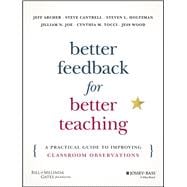Better Feedback for Better Teaching is an essential resource for school, district, and state, leaders committed to high-quality classroom observations. This practical guide outlines the knowledge and skills classroom observers need to identify and help develop effective teaching, and explains how leaders can best facilitate the development of classroom observers.
The best way to ensure high quality instruction in every classroom is to provide teachers with accurate, constructive feedback on practices proven to enhance student learning. Skilled classroom observers help teachers do their best work, so that they can guide students to their greatest potential. Better Feedback for Better Teaching provides helpful, reliable strategies from leading experts and practitioners involved in the Measures of Effective Teaching (MET) project, which carried out one of the largest, most influential studies of classroom observations to date.
Among the many topics covered, Better Feedback for Better Teaching describes how to:
- Build a shared vision of effective teacher feedback among observers
- Ensure a common understanding of a classroom observation tool
- Train observers to collect objective evidence from a lesson, efficiently and free of bias
- Leverage data to improve how observers are trained and supported
This comprehensive resource includes helpful starting points, as well as tips to refine techniques and address new challenges. Each section combines clear explanations of key ideas with concrete, adaptable examples and strategies.
Self-assessments are included to help you quickly rank current needs and find the most relevant solutions. Filled with valuable, practical tools, Better Feedback for Better Teaching helps educators cultivate high-quality classroom observations that improve teaching and learning.








